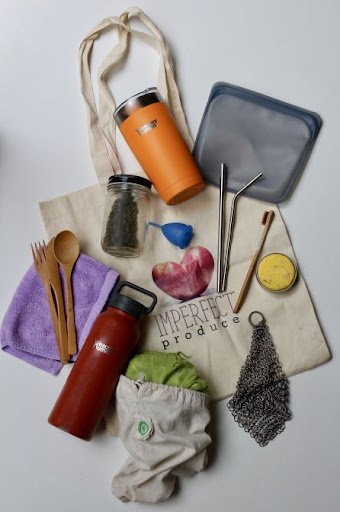Environmental Oblivion: How Are We Supposed to Know Any Better?
Image Courtesy: Strike UF
Tote bags are not as environmentally friendly as we think they are. Neither is almond milk.
How could that be? Our favorite social media influencers’ morning routine videos aren’t complete unless they drink their coffee splashed with almond milk creamer. Walking into Whole Foods or Trader Joe’s without a reusable bag erases the apathetically nonchalant but still entirely eco-friendly persona everyone must assume.
The facts are in: One cotton tote bag must be used about 20,000 times to counteract the environmental impact of its production. A single glass of almond milk requires almost 20 gallons of water to create. Even tossing a banana peel in the grass actually hurts wildlife because food waste takes longer to decompose.
I hope no one ever ventures into their kitchen, whips out a carton of almond milk from the refrigerator, pours the slightly off-white liquid into a glass and drinks it. Worse yet, I hope no one performs this action and enjoys it.
While plain almond milk consumption is, undeniably, a sin, it is one of the most popular milk alternatives. And rightfully so. In cups of coffee, bowls of cereal and as an ingredient in baked treats, it works wonders, especially for vegans who want to reduce their carbon footprints through a plant-based diet.
But 20 gallons of water for one 8-ounce glass? Absurd. And solutions are hazy. Dairy milk is even worse for the environment because of the carbon emissions produced by the animals from where it comes from. And oat milk, while slightly better in terms of earthly impact, is usually at least a dollar more expensive than an identical amount of any other non-dairy milk.
And 20,000 times? Even if you slung on your favorite tote bag every day before braving the world, it would still take about 55 years to reach the 20,000 use goal. As stylish as they are, there is no guarantee they will still be just as popular half a century from now. And even if they (hopefully) are, they’ll be reduced to tattered rags by then — well before the ecological cost of their creation is offset.
It seems every time we try to make a lifestyle change to better the Earth, whether it be the groceries we buy or what we hold them in, we’re eventually told those practices are harmful.
All of this confusing consumerism begs the question: How are we supposed to know any better?
The reality is that major corporations exploit our desire to do everything in our power to save the planet. Instead of taking ownership for being one of the leading influences in environmental disarray, we, the consumers, are blamed. This results in guilt because we feel we aren’t doing enough.
But must we bear the burden? Should we feel guilty? Absolutely not.
Your choice to ask for an alternative milk in your coffee isn’t contributing copious amounts of carbon emissions to the ozone layer. Buying one of those cute “Love on Tour” Harry Styles tote bags — even if you already own a tote — won’t add another degree of heat to the rising climate.
Leading fossil fuel companies like ExxonMobil will.
This doesn’t mean we should throw our hands up in the air, start littering and allow complete environmental mutiny to ensue.
If you’re worried that some of your current lifestyle choices intended to help the planet might actually be hurting it, don’t fret. First, take a deep breath and remember your good intentions. And if you feel so inclined, read Bloomberg Green or Associated Press: Climate Change articles while you checkout at TJ’s or make your commute.
Set yourself free from the bondage of consumer guilt. Undo the shackles of shopper shame. Commend yourself for caring enough to try.
Strike Out,
Writer: Abigail Hasebroock
Editors: Hannah Shelton, AJ Bafer
Graphics: Lari Aguiar
Gainesville



